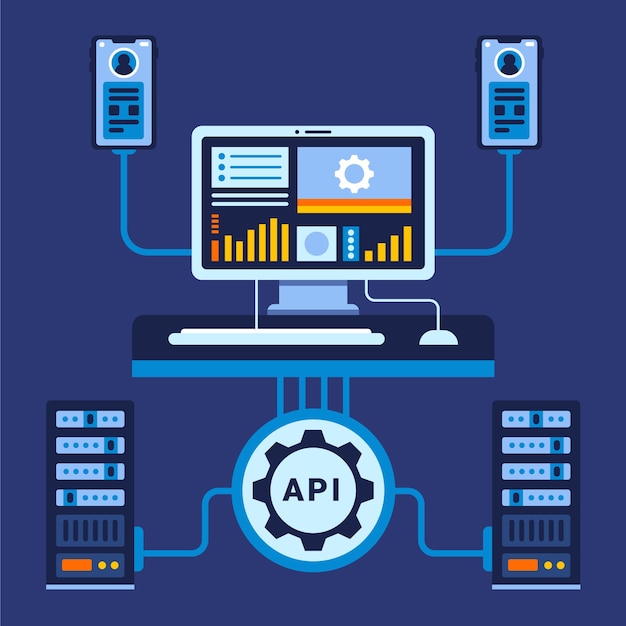Unleashing the Power of APIs: Unlocking New Possibilities with API Hubs and Stores
 Sachin Kumar
Sachin Kumar
In the era of digital transformation, APIs (Application Programming Interfaces) have revolutionized the way software applications interact and communicate with each other. As the demand for APIs continues to grow, the need for centralized platforms that consolidate and showcase APIs becomes increasingly essential. We will delve into the concept of API hub and stores, exploring their significance in simplifying API discovery, fostering collaboration, and driving innovation.
Understanding API Hubs
An API hub can be thought of as a centralized repository or a marketplace that hosts a diverse range of APIs from different providers. It serves as a comprehensive platform where developers can discover, explore, and evaluate APIs. API hubs offer a unified interface that simplifies the process of accessing and integrating APIs by providing standardized documentation, access credentials, and tools.
Benefits of API Hubs
Simplified API Discovery: API hubs gather APIs from various providers in one place, allowing developers to easily browse and explore the available options. By providing comprehensive information about the APIs, including endpoints, functionalities, and documentation, API hubs speed up the process of discovering and selecting the most suitable APIs for developers' projects.
Standardized Documentation: Consistent and standardized documentation is a critical aspect of API consumption. API hubs ensure that all APIs listed on the platform follow these standards, making it easier for developers to understand and utilize the APIs effectively. Developers can rely on the standardized documentation provided by API hubs, reducing confusion and minimizing the effort required to integrate different APIs.
Collaboration and Knowledge Sharing: API hubs often include features like forums, chat rooms, or collaborative spaces that facilitate communication and collaboration among developers. These platforms enable developers to share insights, discuss best practices, and seek help and advice from their peers. Such collaborative environments foster innovation and problem-solving within the developer community.
Understanding API Stores
An API store, also known as an API marketplace, is a platform that enables API providers to showcase and monetize their APIs. API stores offer a way for API providers to package and distribute their APIs to potential consumers. These stores provide a variety of functionalities, such as listing APIs, defining pricing models, managing access, and monitoring API usage.
Benefits of API Stores
Monetization Opportunities: API stores enable API providers to monetize their APIs by defining and implementing various pricing models. Providers can offer free APIs, trial periods, usage-based pricing, or subscription plans. API stores act as a channel for providers to generate revenue from their API offerings, turning APIs into valuable assets.
Increased Visibility and Reach: By listing APIs on API stores, providers gain exposure to a wider audience of potential consumers. API stores attract developers and businesses looking for specific functionalities or use cases, increasing the visibility and reach of the APIs listed on the platform. This exposure can lead to greater adoption and usage of the APIs.
Simplified API Management: API stores provide a centralized platform for API providers to manage their APIs effectively. Providers can control access, set usage limits, monitor API performance, and manage API versions. API stores streamline the administrative tasks associated with API management, allowing providers to focus on delivering high-quality APIs.
The Synergy Between API Hubs and API Stores
API hubs and stores often work in tandem, complementing each other's functionalities to provide a complete API ecosystem. API hubs showcase APIs from various providers, allowing developers to discover and evaluate APIs effectively. Once developers have identified the APIs they need, API stores serve as a platform for providers to list and distribute their APIs, enabling monetization and increasing the reach of their offerings. The combined benefits of API hubs and stores create a thriving environment for developers and providers, promoting collaboration and driving innovation.
Conclusion
API hubs and stores form the backbone of the API economy, offering developers a centralized platform to discover, evaluate, and integrate APIs seamlessly. API hubs simplify the process of API discovery, providing standardized documentation and fostering collaboration within the developer community. Meanwhile, API store empower API providers to monetize their APIs, increase visibility, and streamline API management. By leveraging the synergies between API hubs and stores, developers and providers can unlock the full potential of APIs, driving innovation and catalyzing digital transformation in various industries.
Subscribe to my newsletter
Read articles from Sachin Kumar directly inside your inbox. Subscribe to the newsletter, and don't miss out.
Written by
